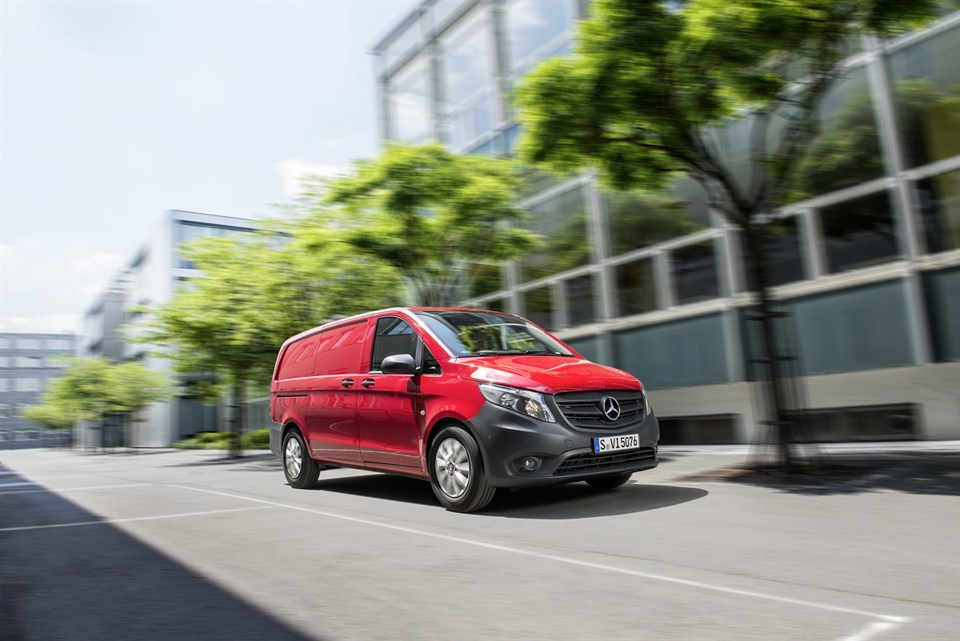Improvements in diesel engine efficiency in commercial vehicles could make the economic case for running electric vans even more difficult, says a major manufacturer.
Steve Bridge, managing director of Mercedes-Benz Vans, believes the technology used in van diesel engines has significantly advanced over the past few years, as a number of manufacturers have been using some of the fuel-saving features already available on cars.
He told Fleet News that there was a danger that fuel savings with diesel would make it more difficult to identify potential savings with electric vans.
Bridge was speaking to Fleet News as the new Mercedes-Benz Vito, due to arrive in the UK in 2015, was unveiled (Fleet News, Jul 28).
He said the next-generation Vito would be available with an electric E-Cell version as in the current range, but its appeal could diminish alongside more efficient diesel power.
“With the Vito E-Cell we were pretty rigid on price when it was introduced three years ago, but since then we’ve been able to add a little more flexible,” he said.
“We’ve realised that they work very well for some operators and we have satisfied customers particularly in places like London.
“But for other van operators, even if we could give them away, they wouldn’t want them.”
He added: “As we go further down the road of optimised diesel engines, it might become more difficult for pure-electric vans to demonstrate their cost effectiveness.”
The new Vito offers fuel consumption improvements of up to 20% with the new entry-level front-wheel drive model using a 1.6-litre diesel engine.
Other more powerful variants use a cleaner version of the 2.1-litre diesel engine found in the current Vito with rear-wheel drive.
Bridge believes all manufacturers striving to achieve new levels of efficiency for diesel engines could strengthen the case for diesel vans over electric alternatives.
“The new Vito’s unique selling point will be class-leading fuel economy with improvements of up to 20% compared with its predecessor, “ said Bridge. “We sell vans in a more consultative way these days and try to find out what customers need to ensure they are choosing the right vehicle for the job.
“Van operators are far more aware of fuel consumption than they were previously.”
The previous Vito stood out as the only rear-wheel drive panel van in its sector, with all main rivals offering front-wheel drive only.
Bridge believes the new model could help win conquest business, but it would also be a possibility that some van operators upgrade from the Citan small van.
“We have to be careful because there is always an element of substitution,” he said.
“I can see some of our customers migrating into front-wheel drive Vito, although it does allow us to compete in a new part of the sector that is more price sensitive.”
Bridge also commended new entrants in the sector that have helped improve quality and the expectations of customers.
“The sector has moved on a level since the Ford Transit Connect was introduced last year, and this is good news for van operators,” he said.
Bridge added that Citan sales were improving in 2014 (up 49% in the first half of the year) and putting the Mercedes-Benz van brand in front of new customers.
“We were very excited to come to market with a small van that has performed so well,” he said.
“This year will be better than last year and reliability has been exceptional. We’re now dealing with customers we haven’t been able to do business with before.”


















Tallpaul - 10/09/2014 12:26
Its a very valid point however with all of the support the government are currently throwing at E.V, the introduction of a price rise of the congestion charge for diesels and no doubt increased fuel duty on diesel there really is still a case for EV's. Average fuel saving for a company changing their diesel van to an EV based on 20k a year over 4 years is £7823, that is based on a ENV-200 size van. EV's are here to stay regardless of how efficient diesels become.